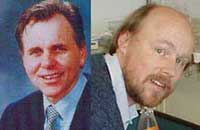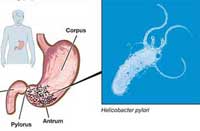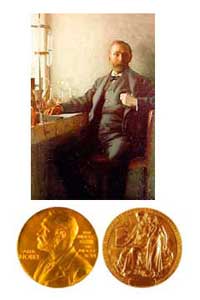The Nobel Committee at the Karolinska Institute, Sweden, has announced the decision to award the 2005 Nobel Prize in Physiology or Medicine to two Australian scientists – Barry J. Marshall and J. Robin Warren – for their discovery of the bacterium Helicobacter pylori and its role in gastrointestinal diseases (gastritis, gastric ulcers, or duodenal ulcers).
 |
| Barry Marshall (left) and Robin Warren. Including these two scientists, there have been 182 laureates in the Nobel Prize in Physiology or Medicine/Psychology to date. |
Collaborative Discovery
Dr. Robin Warren (born 1937) is a pathologist based in Perth, Australia. He observed small, spiral-shaped bacteria living in the lower stomach of about 50% of patients from whom biopsy samples were taken. He found that signs of inflammation consistently appeared in the stomach lining, close to where the bacteria resided.
Professor Barry Marshall (born 1951) from the University of Western Australia became interested in Warren’s discoveries at a young age. The two scientists conducted research on biopsy samples from 100 patients together. After many tireless efforts, Marshall successfully cultured a previously unknown species of bacteria (later named Helicobacter pylori) from several of these biopsy samples. Together, they discovered that this new organism existed in nearly all patients suffering from gastritis, duodenal ulcers, and gastric ulcers. Based on their findings, they proposed that Helicobacter pylori should be considered a causative agent of these diseases.
Although gastrointestinal inflammation can be cured by inhibiting acid production in the stomach, these conditions often recur due to the presence of bacteria and chronic gastritis. In treatment studies, Marshall and Warren, along with other scientists, demonstrated that patients could only be cured of these conditions if Helicobacter pylori was completely eradicated from the stomach. Thanks to the pioneering discoveries of these two scientists, gastrointestinal inflammation is no longer considered a chronic disease but rather a treatable condition with a short course of antibiotics and acid-suppressing agents.
In 1982, when Marshall and Warren discovered this bacterium, stress and lifestyle were considered the primary causes of gastrointestinal diseases. Now, the scientific community firmly asserts that Helicobacter pylori is responsible for over 90% of all duodenal ulcers and 80% of gastric ulcers. The link between Helicobacter pylori infection and gastrointestinal diseases has since been confirmed through numerous studies on volunteers, antibiotic treatment studies, and epidemiological research.
Helicobacter pylori
 |
|
Helicobacter pylori (green image) inhabits the lower stomach (left) |
Helicobacter pylori is a spiral-shaped bacterium that lives in the stomach of approximately 50% of the world’s population and is only present in humans, adapted to the gastric environment. This bacterium is extremely versatile and exhibits different strains in various aspects, such as the ability to adhere to the stomach lining and cause inflammation. Even in a single patient, not all Helicobacter pylori bacteria are identical. Additionally, genetic differences among individuals can influence susceptibility to Helicobacter pylori infection.
In countries with high socioeconomic standards, the prevalence of this bacterium is much lower than in developing countries, where nearly everyone may be infected. People typically acquire the infection in childhood, often from mother to child, and this bacterium can persist in the stomach for the remainder of the infected individual’s life. Chronic infection begins in the lower stomach (the part of the stomach connected to the pylorus), gradually increasing acid secretion in the healthy area of the stomach above, leading to ulcers.
In most individuals, Helicobacter pylori infection usually does not cause symptoms. However, about 10-15% of infected individuals will develop gastrointestinal diseases. Duodenal ulcers are generally more common than gastric ulcers. Serious complications often include bleeding and perforation of the gastrointestinal tract. In some individuals, infection occurs in the upper stomach, leading to gastric cancer. Although gastric cancer has declined in many countries over the past 50 years, it still ranks as the second leading cause of cancer-related deaths.
Helicobacter pylori infection can be diagnosed through tissue biopsy (obtaining samples during endoscopy) or breath tests by detecting a specific enzyme produced by the bacteria in the stomach. The discoveries made by these two Australian scientists have enhanced the understanding of the relationship between chronic infection, inflammation, and cancer.
Alfred Bernhard Nobel
Alfred Nobel was born on October 21, 1833, in Stockholm, Sweden, into a family with many members working as engineers. At the age of nine, he moved with his family to Russia. There, he and his brothers were educated by tutors who taught them their first lessons on humanity and natural sciences. As a young man, he traveled extensively and became fluent in five languages. Nobel had an interest in literature and wrote several novels, poems, and plays in his spare time. In 1860, he began experimenting with nitroglycerin in his father’s factory, Immanuel Nobel.
 |
| Alfred Nobel and the Nobel Prize in Medicine/Psychology |
Alfred Nobel experimented with various methods to stabilize this unstable material. Ultimately, he discovered that mixing nitroglycerin with a fine, porous powder called kieselguhr was the most effective. He named this mixture dynamite and received a patent for it in 1867. Nobel established factories around the world to produce dynamite and other explosives, which were in high demand by construction companies, mining operations, and the military. Dynamite brought Nobel considerable wealth. His other research provided valuable insights into the development of synthetic rubber, leather, silk, and gemstones.
On November 27, 1895, Nobel signed his last will at the Swedish-Norwegian Club in Paris, France. He passed away from a cerebral hemorrhage at his home in San Remo, Italy, on December 10, 1896. He left a sum of $9 million in his will, the interest from which would be used as prizes for those whose research was most beneficial to humanity.
The Nobel Association was established in 1900 according to Alfred Nobel’s will. It is a private organization that manages the assets Nobel bequeathed to award individuals in the fields of Chemistry, Physics, Psychology or Medicine, Literature, and Peace.
Selection Process
The selection of Nobel Prize recipients begins in early autumn of the year prior to the awards, when the awarding organizations invite over 6,000 people worldwide to nominate deserving individuals for the Nobel Prizes. Approximately 1,000 nominations are submitted for each prize. Nominators include past Nobel laureates, members of the awarding organizations, experts in the fields of Physics, Chemistry, Psychology, or Medicine, officials, and members from various universities and research institutes. Nominators must submit written nominations stating their reasons for selection. Self-nominations are not allowed (in stark contrast to the Ig Nobel Prize).
Nominations must be submitted to the Nobel committees by January 31 of the award year. The Nobel committees are established by the four awarding organizations. Typically, around 100-250 individuals are nominated for each prize. On February 1, six Nobel committees—each responsible for a different category—begin reviewing the nominations they have received. Thousands of people, primarily outside experts, work alongside the committees to assess the creativity and significance of the contributions of the nominees.
In September and early October, the Nobel committees prepare to submit their recommendations to the Royal Swedish Academy of Sciences and other awarding organizations. The awarding organizations do not always follow the committees’ recommendations. Meetings and voting within the awarding organizations are kept confidential at all stages, with only the results announced publicly. The final decision of the organizations must be made before November 15 and is irrevocable. Awards are only given to individuals, except for the Nobel Peace Prize, which may be awarded to an organization.
According to the statutes of the Nobel Association, nomination information remains confidential, whether public or private, for 50 years. An individual cannot be nominated posthumously, except since 1974, Nobel Prizes can only be awarded posthumously if the individual was selected as a laureate while still alive but passed away before the award ceremony on December 10. Official support, whether diplomatic or political, for an individual does not influence the selection process as the awarding organizations operate independently from the state.
Awards
Each Nobel Prize consists of a gold medal, a diploma, and a monetary award. The amount of money depends on the income of the Nobel Association. Initially, more than three people could share a Nobel Prize, although this has never occurred. The Nobel Organization’s statutes were amended in 1968 to limit the number of co-recipients to three. In such cases, each person may receive one-third of the monetary award, or two individuals could share 50% of the prize while the third receives the remaining 50%. Occasionally, a Nobel Prize is withheld until the following year. If it is not awarded, the prize money will revert to the fund. Therefore, two prizes of the same type (for instance, two in Physics) may be awarded in one year.
If a prize is declined or not accepted by a certain deadline, the monetary award will revert to the fund. In the past, there have been instances where laureates refused to accept their prize, and governments prohibited their citizens from receiving the award. In such cases, next to the laureate’s name on the list of Nobel Prize winners, the phrase “declined the prize” will be noted.
The motivations behind refusing to accept a Nobel Prize can vary, but the primary reason is often external pressure. For example, in 1937, Adolf Hitler prohibited Germans from receiving Nobel Prizes in the future because he was angered that the 1935 Nobel Peace Prize was awarded to anti-fascist journalist Carl von Ossietzky. At that time, Carl von Ossietzky was a political prisoner in Germany. In some cases, individuals who decline provide an explanation and only accept the gold medal and diploma. The Nobel Prizes in Physics, Chemistry, Psychology, or Medicine are the least controversial. By nature, the Nobel Prizes in Literature and Peace are the most contentious. To date, the Nobel Prizes were not awarded in 1940, 1941, and 1942. The Nobel Prize in Literature was not awarded in 1914, 1918, and 1943.
Minh Sơn (Compiled)
















































